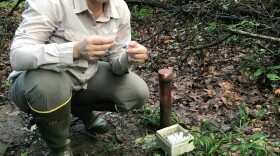
The Environment Report
The Environment Report, hosted by Lester Graham, explores the relationship between the natural world and the everyday lives of people in Michigan.
-
The H2Ohio Wetland Monitoring Program is hoping to get people to take photos for a time-lapse of developing wetlands, and then get more involved as citizen scientists.
-
A new study in the journal Global Change Biology studied a pessimistic policy outlook and an optimistic policy outlook to project how climate change would affect birds in the neotropics, stretching from central Mexico to the southern tip of South America.
-
Game managers say there are too many deer in parts of the state’s Lower Peninsula. The Michigan Natural Resources Commission has added days to the deer hunting season.
-
The state is trading mineral rights to more than 8,000 acres in the Porcupine Mountains for mineral rights on land scattered across six Upper Peninsula counties.
-
A study in the journal Science outlines the many consequences of the loss of ice on lakes because of climate change. Fishing, cultural activities, transportation, water quality, and greenhouse gas releases are all consequences of the loss of lake ice coverage.
-
Michigan faces a high risk of fires. Abnormally dry conditions, and in some places actual drought, have left yards and fields dry. Winds this weekend increase the chance of wildfires.
-
Baby boomers are part of a "silver tsunami" of retirements sweeping across the nation's drinking water and wastewater systems.
-
Enbridge wants to build a new 41-mile section of pipeline to take Line 5 around the Bad River Band of Lake Superior Chippewa reservation. Opponents want Line 5 shut down.
-
The U.S. EPA announced four tribes in Michigan would receive grants to install renewable energy infrastructure to reduce greenhouse gas emissions.
-
University of Michigan economists say Michigan's economy will strengthen once the Federal Reserve begins to lower interest rates.
-
Methane is one of the big three greenhouse gasses, next to carbon dioxide and nitrous oxide.Peter Groffman is a professor at the City University of New…
-
Dry months of the year have been getting hotter in large parts of the U.S.Felicia Chiang is the lead author of a new study on droughts and climate change,…
-
If you’re out on a lake this summer and you stumble on a blob that looks like an alien life form, it could actually be a good thing.Jo Latimore got an…
-
It’s breeding season for monarch butterflies, and government officials from the U.S., Canada and Mexico want your help collecting data on them.The second…
-
Asbestos is known to cause cancer. It’s banned for some uses in the U.S., but it’s not entirely banned.The Environmental Protection Agency is proposing a…
-
There's a scene in the 1967 film The Graduate where a well-meaning friend of the family pulls Dustin Hoffman's character aside at his graduation party,…
-
The state Legislature is considering bills that would speed up wetland restoration in Michigan.“Wetlands are nature’s answer to a lot of our societal woes…
-
More than 16,000 ticks have arrived in Nate Nieto’s mailbox.He’s an associate professor of microbiology at Northern Arizona University, and he launched a…
-
Wind energy became popular because it can reduce the need for polluting coal and gas generated electricity. But, things are shifting now.“The primary…
-
New tariffs are putting some Michigan newspapers and printers at risk of going out of business.There’s more than a little irony in the fact that a state…




















